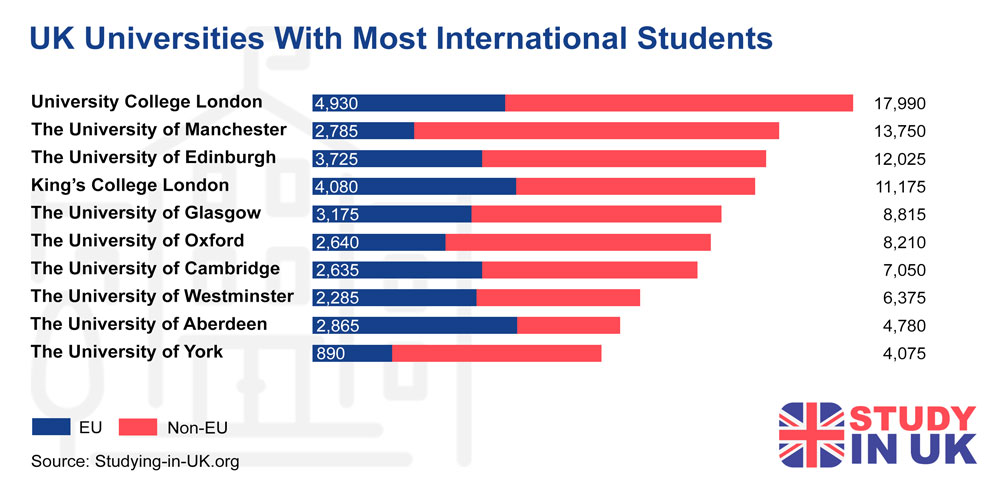Study abroad in United Kingdom for Pakistani students

Study abroad expert advice
Don't waste time! just fill the form to get help.
Studying in the UK is a great opportunity in the world-class academic environment surrounded by rigorous standards, innovative research, and imposing faculties. All the top-ranked universities, like Oxford and Cambridge, which the UK is known for, provide students with the latest facilities, academic resources, and industry connections.
Geography and Demographics about UK
-
Capital City : The city of London is the capital of the UK. The population is 9 million people.
-
Population: The population in the United Kingdom is 67,879,000 and over 80 percent of this figure lives in England.
-
Island of Great Britain: The island of Great Britain is the largest land mass of the United Kingdom.
-
Culture and History
-
Literature and sports: These are some things which are well known around the world that bring forth great writers such as William Shakespeare and J.K. Rowling.
-
The first postage stamp ever to be printed in England. This took place in May in the year 1840. On the stamp appeared the picture of Queen Victoria on the day of coronation.
-
University of Oxford: The University of Oxford is the oldest academic institute located in the United Kingdom.
-
Economy and Trade
-
Exporter Rank: The UK is regarded as the world's fifth-largest exporter.
-
The UK holds the rate of obese people in the whole world at an estimated rate of 27%.
-
In the UK, there is no state religion.
-
The United Kingdom has significant monarchism; therefore, the present monarch ruling is Queen Elizabeth.
Countries With The Highest Origin Of International Students In The United Kingdom

|
Rank |
Country |
Number of Students |
|
1 |
India |
341,000 |
|
2 |
China |
235,000 |
|
3 |
Nigeria |
129,000 |
|
4 |
Pakistan |
114,000 |
|
5 |
Bangladesh |
61,000 |
|
6 |
Malaysia |
56,000 |
|
7 |
Hong Kong |
46,000 |
|
8 |
Saudi Arabia |
44,000 |
|
9 |
United States |
38,000 |
|
10 |
Zimbabwe |
36,000 |
No Of International Students In The Top UK Universities
The table below shows the list of well-known universities in the United Kingdom with an approximate number of non-European international students.
|
Rank |
University |
Number of International Students |
|
1 |
University of Oxford |
11,955 |
|
2 |
University of Cambridge |
10,940 |
|
3 |
Imperial College London |
24,435 |
|
4 |
University College London |
23,275 |
|
5 |
University of Edinburgh |
23,085 |
|
6 |
University of Manchester |
18,685 |
|
7 |
King's College London |
17,070 |
|
8 |
London School of Economics and Political Science |
12,045 |
|
9 |
University of Bristol |
9,935 |
|
10 |
University of Warwick |
9,500 |
Education System In The United Kingdom
.jpg)
-
Primary Education (Between 5 years of age to 11)
Primary education within the UK covers between the ages of 5-11. During this period, children are admitted into primary schools where they would have most of the other subjects aside from their English and mathematics, sciences, humanism among several others.
-
Secondary education (From 11 until 16 years of age)
These are five years of uninterrupted schooling that are compulsive in the UK. In this category, children go to secondary schools; there, they get tremendous amounts of schooling regarding matters like English, Mathematics, Science, Humanity subjects, etcetera apart from the languages.
-
Compulsory Post-school (Age 16-18)
-
UK Compulsory Education after School
Post-compulsory education is a course that one undertakes out of his personal will. Usually, this course is taken for two years. Normally, students take their classes at sixth form colleges, further education colleges, and vocational schools.
-
Higher Education-Age 18+
Universities, colleges, and many more institutions in the UK provide higher education. The programs can be accessed at bachelors, master's and also doctoral levels.
Top Universities in UK
-
University of Oxford - ranked #1 in UK #2 in the world.
-
University of Cambridge - ranked #2 in UK #3 in the world.
-
Imperial College London- ranked #3 in UK and #4 in the world.
-
University College London: Ranked #4 in the UK and #5 around the world.
-
Popular Courses/Programs
-
Courses at UK universities result in an enormous number of undergraduate and postgraduate courses.
-
Business and Management: Business courses, management course, finance course, accountancy.
-
Engineering: Courses in Mechanical engineering, Electrical and electronics, computer science
-
Law: LLB course, LLM course and PhD courses
-
Medicine: MBBS course, MD program and all other degree courses.
UK Programs duration
- Undergraduate Programs: Normally 3 years.
- Postgraduate Programs: Normally 1-2 years.
- Doctoral Programs: Normally, 3-4 years.
- Admission requirements
- UK universities differ both in entry admission from one learning institution to another and even from one program to another.
- Proficiency in the English language. The score obtained in IELTS or TOEFL.
- Academic qualification: A-level, IB or equivalent
- Typical entrance exams: SAT, ACT or GMAT
- Student visa requirements
- The overseas students have to apply for the student visa to pursue their UK study.
- Any type of student who is enrolled into that particular degree level.
- Short-term Study Visa: For short course study.
UK education is considered the best in the world. This is because it has some of the most preferable programs and courses in its institutions for international students. From one end of the world to the other, class universities, scholarship and funding opportunities available for the students.
Full-Funding UK scholarships for international students
- Govt Funded Scholarship UK
- Chevening Scholarship: This scholarship funds fully one or more students from abroad simply so that they can stay in the UK either by Master's course or get prepared and eventually study their doctorate.
- Commonwealth Scholarship: This scholarship goes directly to students of the Commonwealth nations whereby they can undertake Master's and be prepared and subsequently commence their doctorate course studies.
- GREAT Scholarship: This scholarship provides funds to fund international students for them to pursue their master's in the UK.
- University of Oxford-Weidenfeld and Hoffmann Scholarship: The scholarship will pay for full study at the University of Oxford while studying at that institution.
- University of Cambridge Scholarship: The scholarship sponsors a full master's course or any PhD course in Cambridge University.
- Imperial College London Scholarship: It is a scholarship totally funded, by means of which one can engage in research at the level of master's or PhD-level research in Imperial College London.
- STEPS Scholarship to do Master's in the UK at University of St Andrews: All masters degree scholarship. The masters degree research studies that it covered in the UK are under process in the University of St Andrews, UK.
-
Colt Foundation PhD fellowships: Overseas Students Scholarship for a PhD undertaking in Occupational or Environmental Health by a UK University; scholarship is full.
Step-by-Step Guide to Applying to Study in the UK
This guide will give you a good starting point at the application process in the UK. The procedure is complex, but it will keep you on a road to an incredibly successful application.
-
Choose your Course and University
Choose a course that best serves your academic and career interests.Choose a university that delivers your desired course and meets all your requirements.Look at its ranking, reputation, and accreditations.
-
Meet Admission Requirements
Ensure you have entry requirements to the course from your target university.Language requirements, for example, IELTS, TOEFL.Ensure you have the academic qualifications or grades.
-
Prepare Your Application Documents
-
Personal statement: Come up with a personal statement that would be anchored on academic achievements, professional ambitions, and reasons to pursue education in the UK.
-
Academic transcripts: Obtain photocopies of your previous colleges and universities' transcripts.
-
Language proficiency certificates: For instance, IELTS or TOEFL as proof of your language ability.
-
You should also request references from lecturers or professional referees
-
Latest Scholarships in United Kingdom
| Scholarship Name | Country | Education Level | Apply By |
|---|---|---|---|
| UK | PhD | 14 Oct 2025 | |
| UK | PhD | 14 Oct 2025 | |
| UK | Masters | 07 Oct 2025 |













 2025.png)





